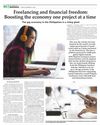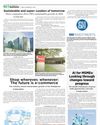
The biometric security on our phones, the grammar-checking tools we use to write emails, and the personalized recommendations on media streaming platforms are powered by AI.
Generative AI, in particular, has been thrust into public consciousness. IBM defines generative AI as AI "that can create original content—such as text, images, video, audio, or software code—in response to a user's prompt or query."
Many of us are now familiar with how generative AI works. As shown by a recent World Bank report, the Philippines ranked 4th in global ChatGPT use. As of March 2024, ChatGPT monthly traffic from the country reached 94.38 million visits, accounting for 4.03 percent of the app's global traffic. The report attributed this to the strong business process outsourcing (BPO) sector and the country's information and communications technology (ICT) presence. But while AI can be beneficial for work, school, and creative pursuits, the proliferation of these tools has also raised concerns about potential issues.
The duality of AI
Is AI a double-edged sword? This is the exact question that Asian Institute of Management Prof. Philip Kwa posed during his presentation at the BPI Cybersecurity and Consumer Protection Conference last July 31, 2024. In his talk about the cybersecurity implications of AI, he talked about how AI can be used to strengthen cybersecurity measures by identifying patterns and anomalies that could signal potential threats, speeding up incident response and recovery and using AI-powered threat intelligence. However, AI can also be used for cybersecurity threats. These may include the use of AI to automate malware campaigns, generate phishing messages, and create realistic deepfakes.
This story is from the November 18, 2024 edition of The Philippine Star.
Start your 7-day Magzter GOLD free trial to access thousands of curated premium stories, and 9,000+ magazines and newspapers.
Already a subscriber ? Sign In
This story is from the November 18, 2024 edition of The Philippine Star.
Start your 7-day Magzter GOLD free trial to access thousands of curated premium stories, and 9,000+ magazines and newspapers.
Already a subscriber? Sign In

Moving stories of 2024
The year 2024 is poised to be another record year post-pandemic for the automotive industry. Sales are estimated to be around 460,000, surpassing last year's 441,000 vehicles sold.

Philippine Luxury Residences: A Market Defined by Growth and Sustainability
The Philippine real estate market remained robust in 2024, with the luxury residential segment emerging as a key driver of growth.
Power Sector to See Brighter Days in 2025
Brighter days await the Philippine energy sector, with no power alerts expected in the year ahead amid intensified efforts to strengthen the country's supply, placing renewables at the forefront.
Top 10 energy news of 2024
Here is my list of the most significant power and energy stories for 2024.
DTI exceeds 2024 investment targets
FEARLESS FORECASTS, TOP PERFORMERS, KEY TRENDS

SM Approaches 2025 With Cautious Optimism
The SM Group is approaching the coming year with cautious optimism, encouraged by the continued growth of the Philippine economy.

Ahead of the curve: Top business trends for 2025
Navigate the future with these emerging opportunities

Freelancing and financial freedom: Boosting the economy one project at a time
The gig economy in the Philippines is a rising giant

Shop wherever, whenever: The future is e-commerce
The industry shows tremendous growth in the Philippines

AI for MSMEs: Looking through changes toward progress
For smaller businesses, AI poses both opportunities and risks